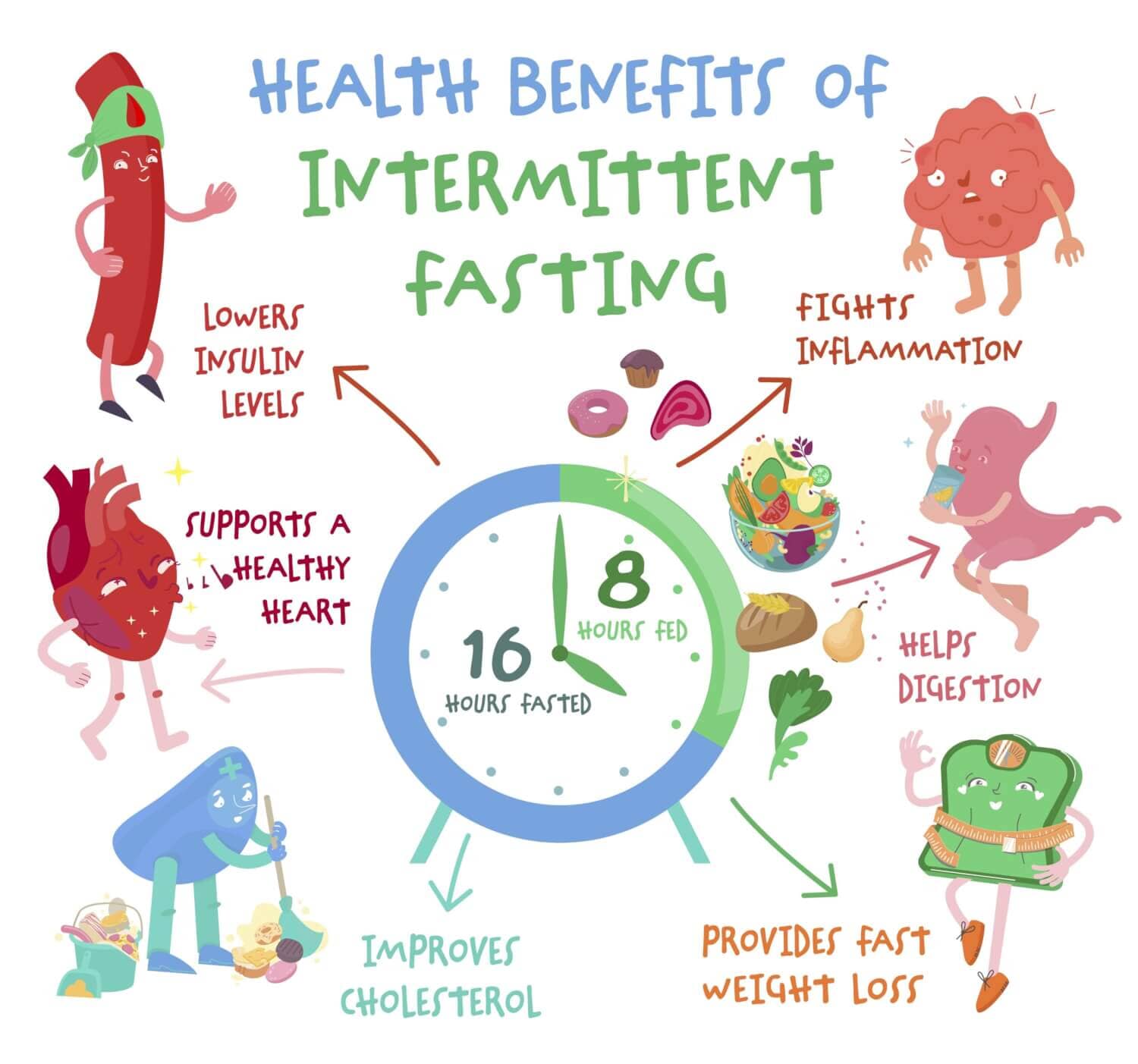
The Science Behind Intermittent Fasting: What You Need to Know
Intermittent fasting, a practice that combines both ancient traditions and modern scientific research, has emerged in recent years as a revolutionary method for improving health. This nutritional strategy, which focuses not on what you eat but when you eat, has been shown to offer a host of health benefits, from improved weight management to increased mental clarity. In this article, we will examine in detail the scientific basis, practical applications, and long-term prospects of intermittent fasting, supported by current studies and expert opinions.

Basics of intermittent fasting
Intermittent fasting encompasses various approaches, all of which have one thing in common: there are set times for eating and periods of fasting. The most popular methods are the 16/8 model, which involves fasting for 16 hours a day and eating during an 8-hour window, and the 5:2 model, which involves drastically reducing calorie intake on two days a week. These methods are based on the theory that extending the fasting periods forces the body to use its energy sources more efficiently.
Intermittent fasting is not a new invention. Historically, people from various cultures have fasted, whether for religious reasons or due to nutritional deprivation. Today, however, it is practiced for health and lifestyle reasons. Scientists such as Dr. Mark Mattson, a neuroscientist at Johns Hopkins University, have studied the neuroprotective and metabolic benefits of intermittent fasting, showing that this practice is more than just a passing fad. To learn more about effective fasting methods, visit the Fasting App .
Intermittent fasting can promote more than just weight loss; it's a lifestyle choice that offers numerous health benefits.
This quote sums up the core philosophy of intermittent fasting: It's not just about reducing calories or losing weight, but about a comprehensive improvement in health and well-being.

Health benefits
The health benefits of intermittent fasting are extensive and well-documented. Among the most notable benefits is improved insulin sensitivity, which has a direct impact on the prevention of type 2 diabetes. Studies have shown that intermittent fasting can help stabilize blood sugar levels and reduce insulin resistance.
Another significant benefit is improved heart health. Fasting improves lipid balance in the body, leading to lower cholesterol levels and a reduced risk of cardiovascular disease. The American Heart Association has recognized intermittent fasting as a potentially effective method for improving heart health.
The neuroprotective effects of fasting are also of great importance. Research suggests that fasting can improve brain function and reduce the risk of neurodegenerative diseases such as Alzheimer's and Parkinson's. Through the process of autophagy, in which cells begin to recycle damaged parts, intermittent fasting may help maintain brain health and enhance cognitive performance. Research also supports the claim that intermittent fasting can increase lifespan. Animal studies have shown that reduced calorie intake, as practiced during fasting, can lead to a longer lifespan. While the exact mechanisms are still being investigated, scientists believe that processes such as improved stress resistance and increased repair capacity at the cellular level may play a role.

Challenges and common mistakes
While the benefits of intermittent fasting are impressive, there are challenges and common mistakes newbies often make. A common misconception is that you can eat whatever you want during eating windows. This can lead to overeating and choosing unhealthy foods, negating the health benefits of fasting. It's important to follow a balanced diet during eating windows for best results.
Another mistake is ignoring bodily signals. Some people overdo fasting and ignore hunger or exhaustion, which can lead to negative health effects. It's crucial to listen to your body and make adjustments as needed, such as shortening fasting windows or slightly increasing calorie intake.
Tips to avoid these mistakes:
- Listen to your body and adjust your fasting schedule accordingly
- Avoid junk food and focus on nutritious foods during meal times
- Stay hydrated, especially during fasting periods
Practical implementation in everyday life
Implementing intermittent fasting into your daily routine can be challenging, but with the right planning and strategies, it's entirely doable. A good place to start is with easier fasting methods, like the 12-hour fasting window, and gradually progress to more stringent methods.
One practical approach is to integrate fasting into your daily routine. For example, someone who doesn't have much of an appetite in the morning can skip breakfast and extend the fasting window until lunch. It's important that fasting fits into your lifestyle, not the other way around. This increases the likelihood of long-term compliance and success.
Examples of integrating fasting into everyday life:
- Plan your meals in advance to ensure you eat balanced meals during your eating windows
- Use apps and tracking tools to monitor your fasting times and eating windows
- Combine your fasting regimen with regular physical activity to maximize the health benefits
Long-term perspectives and outlook
Intermittent fasting isn't just a passing fad, but a nutritional movement with the potential to fundamentally change the way we think about food and health. With a growing body of studies proving its benefits and a growing community of practitioners, intermittent fasting could become a permanent fixture in public health strategies.
The future of intermittent fasting looks promising, with further research focusing on long-term effects, adaptations for different populations, and integration into medical treatment plans. For individuals interested in this practice, it's important to continue to educate themselves, seek medical advice if necessary, and choose a method that is sustainable and beneficial for their individual health.
The popularity and scientific interest in intermittent fasting also presents an opportunity for health-related companies and apps to expand their services and products to provide support and guidance for those who wish to follow this diet. It's likely that we'll see more personalized fasting plans and programs tailored to users' specific needs and goals in the future.
In conclusion, intermittent fasting is far more than just a weight-loss method. It's a powerful tool for promoting overall health and longevity that, when used correctly, has the potential to revolutionize our understanding of nutrition and healthcare. For those interested in beginning this practice, it's important to be well-informed and choose an approach that is sustainable and beneficial to their health.
Overall, intermittent fasting offers an exciting perspective on health and well-being that is both supported by scientific research and has a wide range of practical applications. While there are challenges to overcome, the potential for positive impacts on healthcare and personal well-being is significant. As with any lifestyle change, it is crucial that individuals choose the methods that best suit their specific needs and circumstances and seek professional medical advice when necessary.








